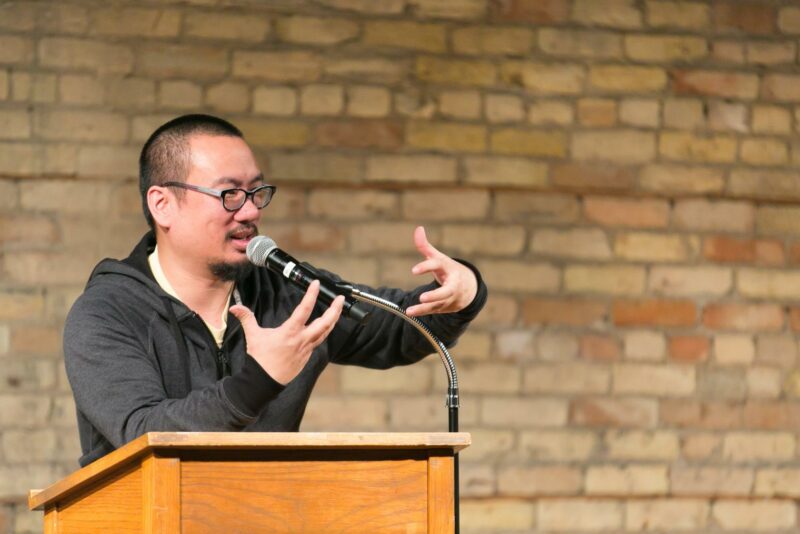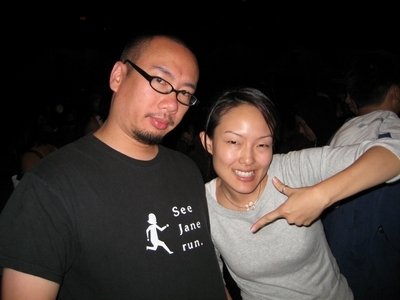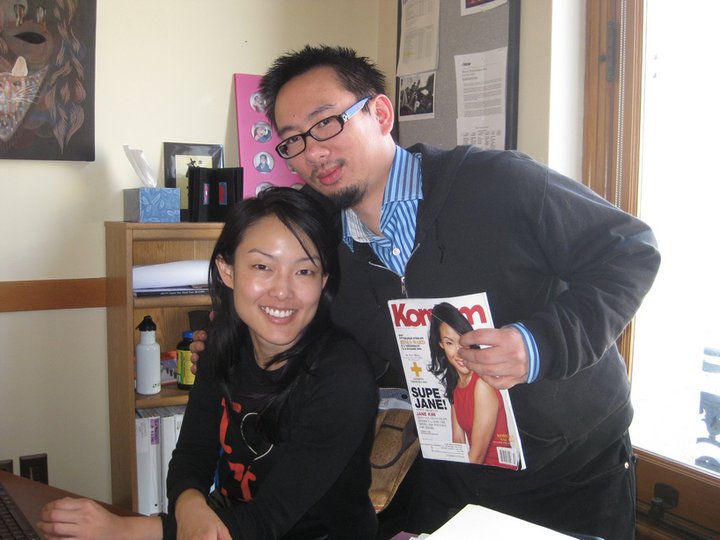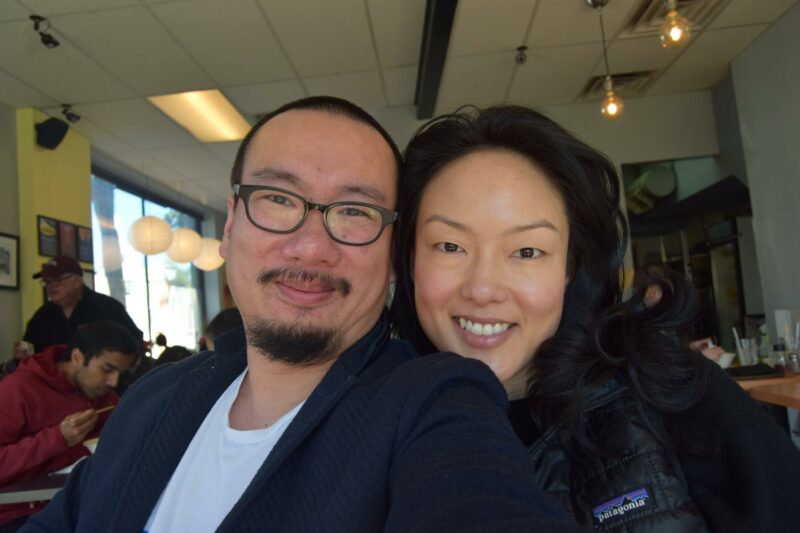This conversation was originally published in The Loft blog. Based in Minneapolis, Minnesota, The Loft is a member-supported organization supporting the rich literary community in Minnesota and beyond. We are pleased to share this conversation with our readers featuring poet Bao Phi and former San Francisco Board of Supervisor member and organizer Jane Kim.

Twenty years ago, Bao Phi—poet, author, and genius behind our events and awards—waltzed into the Loft Literary Center, a whirlwind of change for the better following close behind. As a staple of our community as well as our organization, Bao possesses experience and expertise we can all learn from. Recently, I sat down with him and his close friend, Jane Kim, to try and do just that. — Savannah Brooks, The Loft.
Bao (B): Jane, dear, do you want to start by telling our readers a little bit about you?
Jane (J): My name is Jane Kim. I’ve been friends with Bao Phi for almost two decades—
B: Jesus Christ
J: I live in the Bay Area, in San Francisco, where I work as the California political director for Bernie 2020. I served as an elected official for twelve years, starting on the Board of Education and then running for and winning a seat on the San Francisco Board of Supervisors, which is the legislative branch of government locally. Prior to that, I was a youth community organizer, and on the side, a cofounder and director of Locus Arts, an all volunteer-run Asian American performance venue space with a group of young artists and organizers. That’s how I got invited to the Asian Pacific Islander American Poetry Summit in 2001, where I met Bao.
B: And incidentally, if I can namedrop, Locus Arts is where I met Ali Wong back in the day. You’ve seen Always Be My Maybe, right?
J: I have. When we first met, I would never have imagined that there would be a rom-com with all Asian American leads. I still remember when Lost came out, and you told me it was the first show to ever have two Asians or Asian Americans kissing on primetime.
B: On primetime in a mainstream American show, as far as I know.
J: And that’s when I became a huge Lost fan!

B: So you kind of knew me back in the day before Youtube, before social media, and the art and artists, the poets, we really had to hustle.
J: It was real hustle. We were just excited to have websites and email. We thought that was really cool. I think a lot about how our twenties would have been if we had social media. In some ways, I’m so relieved we didn’t.
B: Absolutely, I am too.
J: And in other ways, I see how it has been a positive for local artists. To be able to distribute your own work independently is huge. How do you look at that? As someone who’s been an artist for the last two decades?
B: I try to take a long view of it. I think there’re pros and cons to everything. The advantage young people have is that they can really fast track their success and control their own fate with the tools that they have. But they also have a lot more competition. Back in the day, I felt like we could rely on one another. If I didn’t know how much to charge an organization that wanted to bring me in, I would just call or email one of my friends who was also trying to hustle and ask them what they were charging. We took care of each other.
J: What are other pressures you see that have changed for artists?
B: When I was hustling, if I went and did a show, there’d be one or two people who didn’t like me or like what I had to say. They would either tell me about it, or they’d write a blog post, and no one would read it, and that was it. Whereas now, if you put something online, you have the potential to get two million viewers, but then you also get people who just hate everything and write these terrible things about you, basically, “Fuck you, you’re wack, go kill yourself.”
J: I saw that during my time too.
B: I would definitely get hate mail, but back then, it required real effort for people to send you hate mail. They’d have to email or snail mail you something.
J: There wasn’t the vitriol and hate we see now coupled with social media. I was coming out of office as we saw elected officials like Sanders and AOC successfully use social media to harness a larger platform and have a larger reach, which is the advantage, but of course it also increases the death threats, the hate, the violence. It’s a double-edged sword.
B: It seems like there’s been a surge of people wanting to support these great women of color politicians who are young and left of center. And obviously when I think of that, I think of people like you, Jane, who did this a decade ago.
J: My team and I talked about this. I had an all women of color legislative team, and for us, it was extraordinary to watch.
B: I know that you’ve had to deal with people second-guessing you and judging you. And I definitely felt that for myself as well, coming in as a community artist and working at a nonprofit. People make assumptions about what we do.

J: One of the biggest challenges I faced in office was learning how to own my story. I saw what it was like for institutions to spend millions of dollars creating my story for me, and it was incredibly disempowering to feel like I had no control over who I was. You can create committees—like Committee for Bao Phi, Committee for Bao Phi’s Amazing—but some of my opponents, all the committees they created were Committees on How Jane Sucks.
B: Wow.
J: The hardest lesson—and it took me years—was to regain ownership over my story and learn how to exist in a dichotomy where my race and gender were used against me almost every day, sometimes in crushing ways, while still holding power. And to have this power that has historically only been given to white men with property and to own it is a lot harder than people think it is. I see women, people of color, LGBTQ folks really struggle when they get to office because they’re constantly told they don’t have power. That’s the challenge of where we often are with progress, right? Things have gotten better and things have gotten worse. I can run for office, and I’m taken seriously—people spend millions of dollars for and against me—and I can win. My grandmother couldn’t run for office. That’s progress. And yet, when people disagree with me, I don’t get emails about how people disagree with me. The emails are, “You chink, go back to China, I know where you live.”
B: Right, right.
J: You’re also a public figure. You’re a positive role model, people look up to you, but you also have something to say, and you have never shied away from that. And so you also get that hate and misunderstanding, which I think is even harder than the hate. I don’t mind when people dislike me if they understand my position. But it’s worse when they misunderstand your position.
B: Exactly. Exactly right.
J: So what is that experience like for you? How have you developed over the last two decades in how you approach it?
B: Part of it is just our culture in general; it’s very dichotomous. There’s a right and a wrong. And if you’re doing wrong: break out the pitchforks. For instance, if there’s a white poet who has a faux pas about race, he’ll get dragged on social media, and that’s fine. But then you have an amazing show featuring all poets of color, and nobody shows up. That’s a problem. I think critique is fair and necessary, but at the same time, folks have to show up. They need to support the things they believe in as much as they criticize the things they don’t.
J: Definitely. I definitely agree.
B: I’m glad social media wasn’t around when I was twenty because I was stupid, and I would’ve popped off about stuff instead of taking a step back and reading alternative perspectives and thinking to myself, “Do I really need to put my opinion on this out there? What is my intention about saying or writing this thing?” But there’s good stuff too. You know, I started this position as a receptionist, and quite frankly, kind of going back to your point about not owning power, I didn’t think I was even qualified to be that. I remember my job interview, and I was like, “Why am I even doing this? I’m not gonna get hired at the Loft.” Even though I was a writer at the time. So the fact that I’m here twenty years later as director of events and programs is amazing. I don’t know if I told you, Jane, but I got a full scholarship to Macalaster College, and there were kids back then who said I only got in because of my race, because I was a non-white person. And when I was young, I didn’t know any better, so I didn’t contradict them. I was like, “Oh that’s messed up.” I think for women, queer people, people of color, indigenous folks, marginalized folks, there are ways in which we don’t step into our power even when we’re in this position.

J: And by the way, I don’t think it’s the same as the power that white men hold, because our power is constantly questioned. When I moved to San Francisco twenty years ago, there was only one Asain American on the Board of Supervisors. And this is more significant for San Francisco because Asain Americans have been here in large numbers since the mid-1800s. So we have third-, fourth-generation Asian Americans.
B: Whereas in Minnesota, the big groups of Asians are Southeast Asians, like my family, who really only came here in the mid-70s. There were Asians here before, but the big groups of Asians are Southeast Asian refugees from war.
J: It was really a long time coming. It took 160 years for us to get to a place where we were actually represented in a government that has represented Asians and Asian Americans for well over a century. When I got into Stanford, my grandmother asked my parents why I wasn’t going to community college, you know, so the education wasn’t wasted on me. Later, as I started moving forward in my career, she confided in my dad that she was envious of me for the things that I’ve been able to do because those were things she could never even consider. For her, it was about marrying well. That’s what an ambitious woman did: marry well.
B: Both of my parents actually loved art and poetry, but they loved Vietnamese art and poetry. So for them, there was this weird, contradictory feeling. They loved Vietnamese arts and poetry but knew they lived in a culture that doesn’t value that. And yet here they had a son who was going into art in the English language, and they feared for my survival, which is a pressure a lot of people don’t understand. The stereotype is that Asian parents aren’t supportive of the arts, when really that’s not true. I remember my mom emceeing Vietnamese cultural events where there was music and dancing; arts were absolutely at the forefront. They just couldn’t comprehend a way for their Vietnamese refugee son to be successful in the American world.
J: And you’ve been very successful.
B: I had really good mentors. I think about the generation above me, the writers of color and indigenous writers, and how much emotional labor they spent on us for no money. They did it because they believed that’s what indigenous and writers of color should do. I feel the same sense of responsibility—and part of it is stymied by the breakneck pace of life and being a father and needing to take care of my kid—but I feel the need to pay it forward. That generation really went out of their way to be generous with me and create opportunities for me, and I need to do the same.
Check out poems by Bao Phi published by diaCRITICS:
- Bao Phi Poems for OUT OF THE MARGINS
- Video Poem (with Tony Nguyen): “Future Letter to Daughter Apologizing for When I Caved to Her Request and Brought Her to Barbie’s Dream House at the Mall of America”


